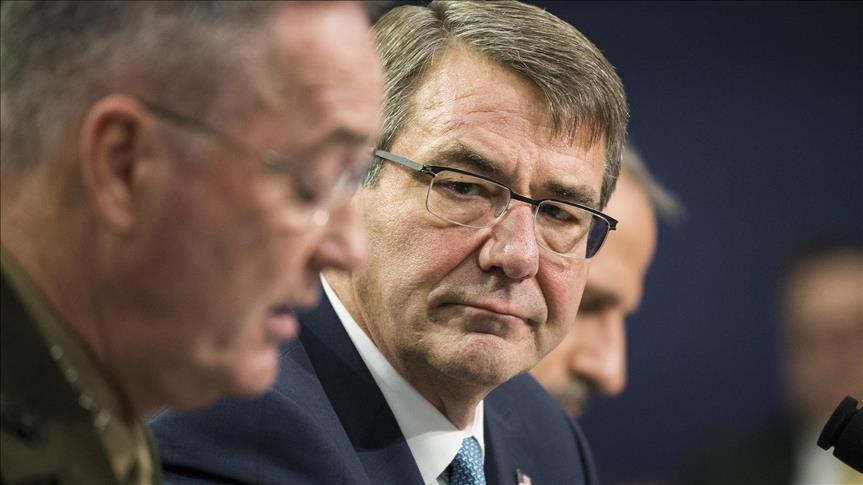 Secretary of Defense Ash Carter listens as Chairman of the Joint Chiefs General Joseph Dunford testifies during a House Appropriations Committee hearing on the proposed 2017 Department of Defense budget in Washington, USA on February 25, 2016. ( Samuel Corum - Anadolu Agency )
Secretary of Defense Ash Carter listens as Chairman of the Joint Chiefs General Joseph Dunford testifies during a House Appropriations Committee hearing on the proposed 2017 Department of Defense budget in Washington, USA on February 25, 2016. ( Samuel Corum - Anadolu Agency )
Washington DC
WASHINGTON
The U.S. will respond to provocation or aggressive acts by adversaries with overwhelming force, the head of America’s defense said Thursday.
“Key to our approach is being able to deter the most advanced adversaries while continuing to fight terrorist groups,” Ash Carter told lawmakers. “This means we must have -- and be seen to have -- the ability to impose unacceptable costs on an advanced aggressor that will either dissuade them from taking provocative action, or make them deeply regret it if they do.”
Carter’s comments came during testimony before a House panel where he defended the Defense Department’s budget. He appeared alongside Chairman of the Joint Chiefs of Staff Gen. Joseph Dunford.
Noting Russia and China’s advancement in military systems that threaten American global interests, Carter said the U.S. military would be prepared “to fight very differently than in Iraq and Afghanistan, or in the rest of the world’s recent memory”.
Washington is not happy with Russia’s increasing influence in Eastern Europe.
Moscow has annexed the Crimean peninsula in 2014 after the Russian-backed government was ousted as a result of nationwide protests.
Russia has also been supporting separatists in eastern Ukraine -- alarming several Eastern European nations, including some NATO allies such as Estonia.
The Defense Department has quadrupled funding for forces in Europe but Carter said the U.S. would not respond to acts of aggression against Europe with only daily forces but with "the whole weight of the American military behind the defense of Europe".
Supreme Allied Commander Europe Gen. Philip Breedlove, who also gave testimony, said Russia has chosen to be an adversary and “poses a long-term existential threat to the United States”.
"To counter Russia, EUCOM, working with allies and partners, is deterring Russia now and preparing to fight and win if necessary," Breedlove said, referring to the U.S. European Command.
“This is not the Cold War, but I do believe we are not where we need to be now in a mixture of permanently forward-stationed forces and pre-positioned stocks so that we can rapidly fall in on it,” he added.
Russia, on the other hand, has repeatedly warned that NATO’s deploying military assets to Eastern Europe constitutes provocative acts that can undermine regional stability.
The U.S. Navy in the Pacific has long been viewed as a challenge to China since Beijing claimed sovereignty of man-made islands in the South China Sea and began to militarize them by deploying air defense missiles and other military assets.
“In some cases, they’re developing weapons and ways of war that seek to achieve their objectives in ways they hope would preempt a response by the United States,” Carter said, referring to Russian and Chinese actions.
“While we do not desire conflict with any of these nations -- and, to be clear, though they pose some similar defense challenges, they are very different nations and situations -- we also cannot blind ourselves to the actions they choose to pursue,” he added.
Speaking on the war against Daesh, Carter said Syrian rebel groups are now preparing to go after the militants’ self-declared capital of Raqqa, after retaking the key eastern town of Shaddadeh.
Dunford told lawmakers that Syrian Democratic Forces are "going down to now isolate" Raqqa and have cut militants’ communication between Iraq and Syria.
Responding to question about President Barack Obama’s visit to Cuba, Carter assured lawmakers that Obama will not make any announcements about the future of the U.S.-controlled naval station and detention center at Guantanamo Bay.
The Cuban government has insisted on the return of Guantanamo Bay before a complete restoration of diplomatic relations between the two nations.
The Obama administration is attempting to fulfill a campaign promise made in 2008 by then-Senator Obama to close the detention facility if he were elected president.
Anadolu Agency website contains only a portion of the news stories offered to subscribers in the AA News Broadcasting System (HAS), and in summarized form. Please contact us for subscription options.







